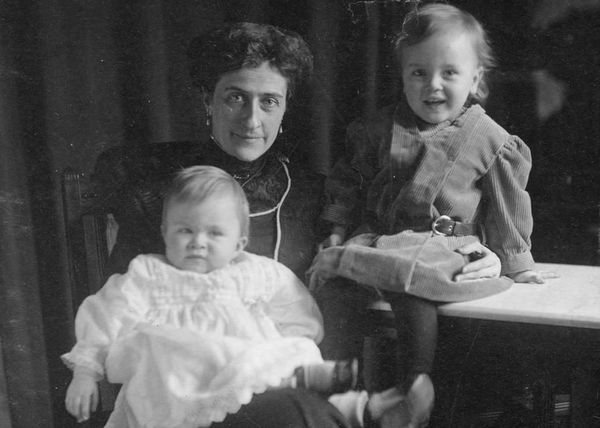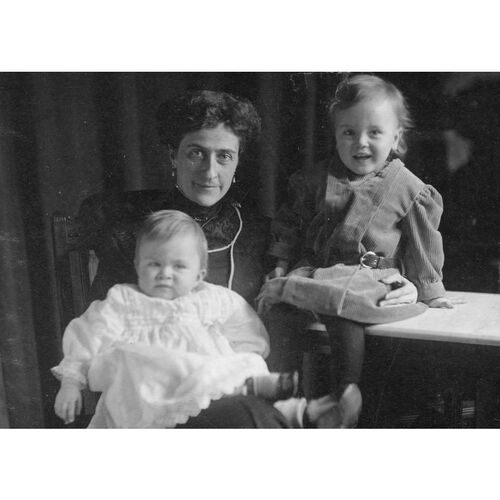
Source: Link
SIROIS, MARIE (baptized Marie-Louise-Justine-Atala) (Boivin), the first female recipient of a certificate from the Université Laval in Quebec City; b. 12 March 1878 in Quebec City, daughter of Louis-Philippe Sirois, a notary, and Atala Blais; m. there 20 Oct. 1908 Joseph-Pierre-Henri Boivin, a lawyer, and they had two sons and four daughters; d. there 2 Feb. 1934.
Everything prepared Marie Sirois for religious life: not only the pious atmosphere that reigned at home, but also her years of study as a boarder at the Jésus-Marie convent in Sillery, beginning in 1884 shortly after the death of her mother, who had also studied there. She was content in that environment, where she was influenced by a nun, Mother Marie de Lourdes, and preachers, especially Paul Bruchési, a future archbishop of Montreal. A brilliant girl, she had a great aptitude for learning and obtained her graduation diploma in 1896. In February 1898 she became a novice at the Congregation of Notre-Dame in Montreal, where she was known as Sister Madeleine de la Résurrection. To her regret, health problems forced her to leave the convent two years later. Her father, who had remarried in 1889, had been teaching at the law faculty of the Université Laval in Quebec City since 1887. The financial comfort enjoyed by Marie’s family enabled her to take a trip to Europe in 1901–2 with members of the Religious of Jesus and Mary. In a diary she inscribed her memories and impressions of the monuments and sites of France, Switzerland, Spain, and Italy.
A voracious reader, Marie’s interests were all-encompassing: culture, science, religious works, and creative writing. The pioneering path she followed after her return to Quebec City testifies to the difficulties faced by girls who wanted to acquire a university education [see Marie-Aveline Bengle; Marie Lacoste*]. She took French literature courses at the Université Laval with Louis Allard, a professor of literature from the Université de Paris; he had been invited in 1902 by Abbé Camille Roy*, on the advice of the academician Ferdinand Brunetière, to assume the new chair of French literature. Until 1905, when Allard would return to Paris, two types of courses open to women were offered. One was a public course, which consisted of free lectures. The other was an instructional course, intended for enrolled students such as Marie, who had to do assignments and could take part in a final examination, and also for auditing students, who were not required to submit work but who could not write the final examination. (It was not until 1920, when the École Normale Supérieure was founded, that an instructional course in French literature taught at the university level would once again be offered in Quebec City.) In May 1904, to encourage students to study literature and to promote enrolment, the Université Laval created a certificate in literary studies and immediately awarded it to graduates of the instructional course who had distinguished themselves by their diligence and success. Marie was among them. She obtained her certificate “with high praise,” but she received it by mail, unlike the other two students in her class, François-Xavier Jules Dorion and Georges Pelletier*, who were invited to the degree-granting ceremony. The university, one of whose buildings would bear the name of Marie Sirois, would attempt to repair this injustice in 2003 by publicly presenting a copy of her certificate to her descendants.
Marie married lawyer Joseph-Pierre-Henri Boivin in 1908. In 1910 she gave birth to Henri, who would be followed by Jeanne, Mariette, Alice, Cécile, and Philippe. She dedicated her life to the education of her children, to spiritual reflection, and to charitable works. She was one of the preferred speakers at meetings of former students of the Jésus-Marie convent in Sillery. On 2 Feb. 1934 she died of cancer at the age of 55.
Her entry into the order of the Congregation of Notre-Dame might have led Marie Sirois into teaching, but her poor health made that choice impossible. Unlike the literary women of her generation, such as Blanche Lamontagne*, Laetitia Desaulniers, and Marie-Antoinette Tardif*, for example, who were born during the 1880s and 1890s, she could not take advantage of her move to Montreal to pursue studies that might have pointed her towards other horizons. As it happened, the École d’Enseignement Supérieur pour les Jeunes Filles, which these three writers attended before going on to join the ranks of the literary community or enter the field of journalism, had been set up by Sister Sainte-Anne-Marie [Bengle], of the same congregation, only in 1908. After she received her certificate in literary studies, Marie’s trajectory was similar to that of many young women of her background: marriage and the education of her children.
Marie Sirois was one of Quebec’s francophone pioneers. Even though she did not become a public figure, her life holds interest from a historical and archival point of view, bearing witness to a time when women, who had almost no right to an education and could not, without difficulty, pursue a career, had tight-knit relationships with their families, their female friends, or the church. This extract from a poem that Marie addressed to a nun provides an example:
Between us, my sister, nothing dies
Nothing changes and nothing grows weak;
From earth to heaven, for which I long,
[There] floats a tie that unites us:
This thread of pure gold is prayer;
I can speak to God about You,
And for a very long time, I have been hoping
That you can speak to Him about me.
Her still-unpublished personal writings (diaries, travel notebooks, correspondence, and addresses) not only convey her cultural tastes, psychological needs, personality traits, and spirituality, but also express the literary, moral, and religious thought of her time. In short, her certificate, which she did not receive publicly during her lifetime, is testimony to her intelligence, determination, and talent, and also to the slow social progress in French Canada, especially with regard to the education of girls.
Marie Sirois’s diary is held at the Univ. Laval, Div. des arch. (Québec), P259.
BANQ-Q, CE 301-S1, 12 mars 1878, 2 oct. 1883; CE 302-S1, 22 mai 1889. FD, Cathédrale Notre-Dame (Québec), 20 oct. 1908. Au fil des événements (Québec), 19 nov. 1981, 6 juin 2002, 19 juin 2003. Le Soleil, 3 févr. 1934. Fabienne Deschênes, Que reste-t-il de Sillery … ([Québec], 1984). Micheline Dumont et al., Les couventines: l’éducation des filles au Québec dans les congrégations religieuses enseignantes, 1840–1960 (Montréal, 1986). James Lambert, Répertoire numérique détaillé du fonds Marie-Sirois (P259) (Sainte-Foy [Québec], 1990). Renée Larochelle, “Une progression fulgurante,” Contact (Québec), 16 (2001–2), no.3: 29. La vie littéraire au Québec, sous la dir. de Maurice Lemire et al. (6v. parus, Sainte-Foy, 1991– ), 5.
Cite This Article
Marie-Josée des Rivières, “SIROIS, MARIE (baptized Marie-Louise-Justine-Atala) (Boivin),” in Dictionary of Canadian Biography, vol. 16, University of Toronto/Université Laval, 2003–, accessed January 1, 2026, https://www.biographi.ca/en/bio/sirois_marie_16E.html.
The citation above shows the format for footnotes and endnotes according to the Chicago manual of style (16th edition). Information to be used in other citation formats:
| Permalink: | https://www.biographi.ca/en/bio/sirois_marie_16E.html |
| Author of Article: | Marie-Josée des Rivières |
| Title of Article: | SIROIS, MARIE (baptized Marie-Louise-Justine-Atala) (Boivin) |
| Publication Name: | Dictionary of Canadian Biography, vol. 16 |
| Publisher: | University of Toronto/Université Laval |
| Year of publication: | 2020 |
| Year of revision: | 2020 |
| Access Date: | January 1, 2026 |



